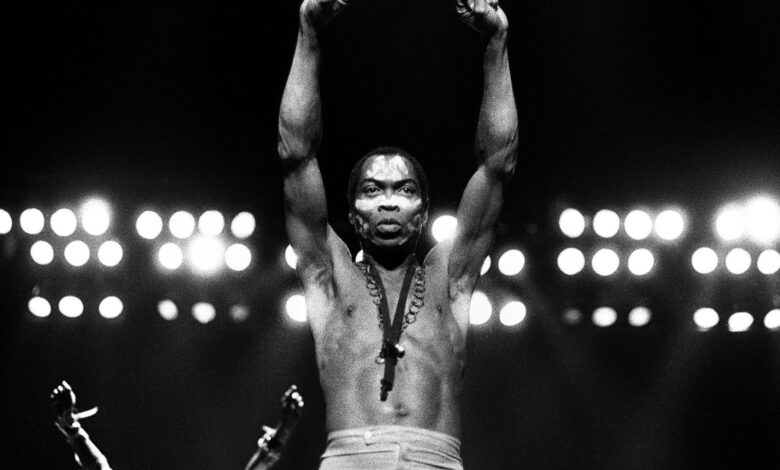

Fela Anikulapo Kuti was a Nigerian musician who was widely regarded as the king of Afrobeat. Born on October 15, 1938, in Abeokuta, Nigeria, Fela’s music was a fusion of jazz, funk, and traditional African rhythms. He was also a political activist and a cultural icon, who spoke out against corruption, oppression, and social injustice. In this article, we will explore the untold stories and influences of Nigeria’s most celebrated musician. From his childhood in Abeokuta to his rise as the king of Afrobeat, we will uncover the lesser-known aspects of Fela’s life, his music, and his legacy.
Fela’s childhood and early influences
Fela was born into a prominent family in Abeokuta, Nigeria. His father was a Christian minister and educator, and his mother was a feminist and political activist. Growing up, Fela was exposed to a wide range of music, including traditional Yoruba music, highlife, and jazz. He learned to play the piano from his mother, who was a skilled pianist, and he also played the trumpet in his school band.
Fela’s early influences included the American jazz musicians Miles Davis and John Coltrane, as well as Nigerian highlife musicians such as Victor Olaiya and Bobby Benson. He was also influenced by the teachings of his mother, who instilled in him a strong sense of social justice and political activism. These early influences would shape Fela’s music and his worldview for the rest of his life.
Fela’s musical journey and style
After studying music in London, Fela returned to Nigeria in the 1960s and formed his first band, Koola Lobitos. The band played a mix of highlife and jazz, but it was Fela’s experiments with Yoruba rhythms and African percussion that would eventually lead to the creation of Afrobeat.
Afrobeat is a complex blend of African rhythms, jazz, funk, and rock music. It is characterized by its use of complex polyrhythms, call-and-response vocals, and extended instrumental solos. Fela’s music often featured lyrics that were critical of the Nigerian government and its leaders, which made him a controversial figure in Nigerian society.
Despite the controversies, Fela’s music was hugely popular in Nigeria and beyond. He performed all over the world, including in the United States, where he played at the Apollo Theater in Harlem. His music inspired a generation of young Nigerians to embrace their cultural heritage and to stand up against social injustice.
Fela’s political activism and influence
Fela was not just a musician; he was also a political activist who used his music to speak out against corruption, oppression, and social injustice. He was a vocal critic of the Nigerian government and its leaders, and he was not afraid to speak his mind. Fela’s political activism often put him in direct conflict with the Nigerian government, which saw him as a threat to their authority.
In 1977, Fela’s Kalakuta Republic compound was raided by the Nigerian army, and he was severely beaten and imprisoned. The attack, which was ordered by the Nigerian government, was meant to silence Fela and to put an end to his activism. But instead, it only made him more determined to fight for his rights and the rights of his fellow Nigerians.
Fela’s influence on Nigerian and African music cannot be overstated. His music inspired a generation of young Nigerians to embrace their cultural heritage and to stand up against social injustice. His influence can be heard in the music of many contemporary Nigerian and African musicians, who have continued his legacy of fusing traditional African rhythms with Western influences.
Fela’s controversial personal life
Fela was a controversial figure not just because of his political activism, but also because of his personal life. He was known for his polygamous relationships and for his use of marijuana. He also claimed to have spiritual powers and to be able to communicate with the dead.
Fela’s personal life was often the subject of controversy and criticism. But it was also a reflection of his unconventional and rebellious spirit. He refused to conform to society’s expectations and instead lived life on his own terms.
Fela’s legacy and recognition
Fela’s legacy lives on today, more than two decades after his death. But his music continues to inspire and influence musicians all over the world. And his message of social justice and political activism remains as relevant today as it was when he was alive.
In Nigeria, Fela is celebrated as a national hero, and his legacy is honored through the annual Felabration festival. This takes place in Lagos and attracts thousands of fans from all over the world. In 2020, Fela was posthumously inducted into the Rock and Roll Hall of Fame. A recognition of his enduring influence on modern music.
The Fela Kuti discography – a guide
Fela’s discography is extensive, with over 50 albums to his name. Here are some of his most essential albums:
- “Fela Fela Fela” (1971) – This album features some of Fela’s earliest recordings, including the classic track “Fefe Naa Efe”.
- “Zombie” (1976) – The title track of this album is one of Fela’s most famous songs, and it was a scathing critique of the Nigerian military.
- “Sorrow, Tears and Blood” (1977) – This album was recorded shortly after the raid on Fela’s Kalakuta Republic compound, and it features some of his most powerful and emotional songs.
- “Beasts of No Nation” (1989) – This album was recorded after Fela’s release from prison, and it features some of his most politically charged songs.
Fela Kuti’s influence on modern music
Fela’s influence can be heard in the music of many contemporary Nigerian and African musicians. Also in the music of Western artists who have been inspired by his sound and message. Here are some of the ways that Fela has influenced modern music:
- Afrobeat – Fela’s genre-defining sound continues to inspire musicians all over the world. And this made Afrobeat become a popular genre in its own right.
- Hip hop – Fela’s music has been sampled by many hip hop artists, including Nas, Jay-Z, and Mos Def.
- World music – Fela’s music has helped to popularize world music and to break down cultural barriers.
- Political activism – Fela’s message of social justice and political activism has inspired many contemporary musicians to use their platform to speak out against injustice.
Conclusion
Fela Anikulapo Kuti was a true representative of the African spirit. His music was a fusion of jazz, funk, and traditional African rhythms. But his lyrics made him stand out as a unique voice of his time. Fela’s political activism and his unconventional personal life made him a controversial figure. His music and his message of social justice and political activism continued inspiring musicians all over the world. Fela’s legacy lives on today, more than two decades after his death. But his impact on Nigerian culture and beyond is immeasurable.




